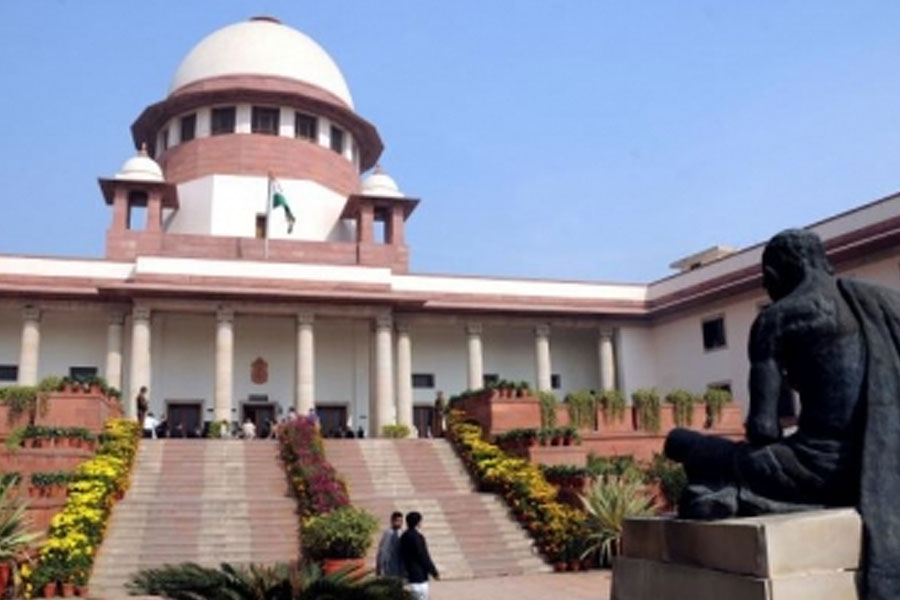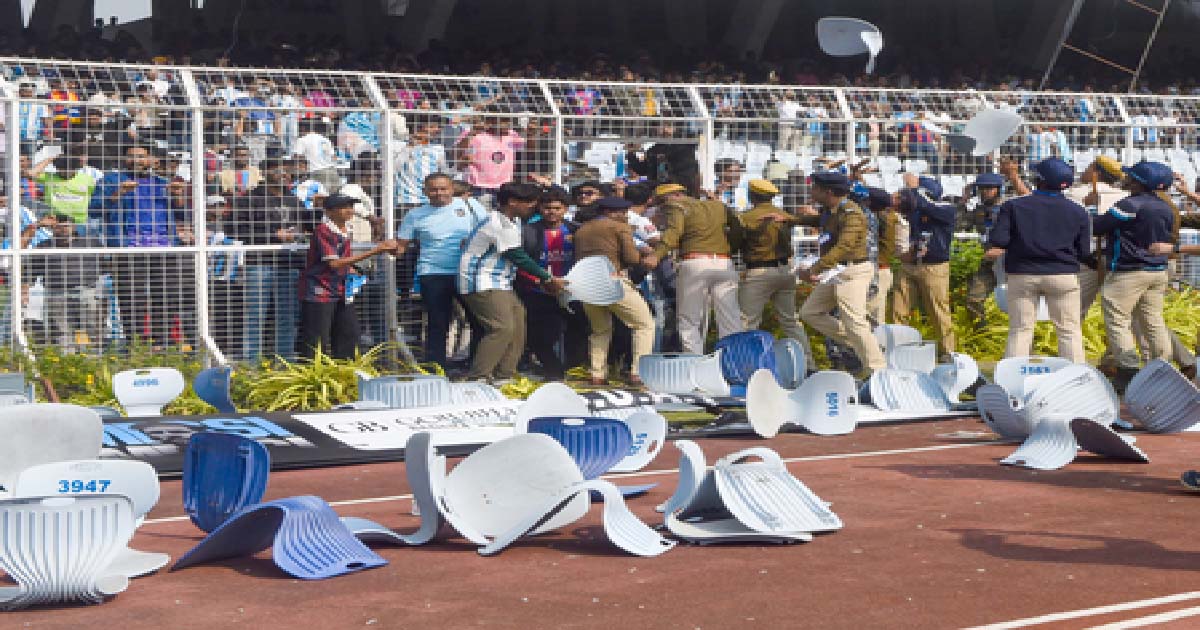National News
‘Matter will have far-reaching ramifications, sensitive in nature’, Centre to SC on identifying minorities

The central government has sought more time from the Supreme Court to hold consultations with the state governments on petitions seeking to identify minorities, including Hindus, at the state level.
In a status report, the Ministry of Minority Affairs said that the 14 state governments, namely Punjab, Mizoram, Meghalaya, Manipur, Odisha, Uttarakhand, Nagaland, Himachal Pradesh, Gujarat, Goa, West Bengal, Tripura, Uttar Pradesh, Tamil Nadu, and three union territories (UTs) namely Ladakh, Dadra & Nagar Haveli and Daman & Diu, and Chandigarh have furnished their comments/views.
It added that since the comments/views of the remaining 19 state governments/UTS in the matter have not been received as on date, a reminder was sent to these states requesting them to furnish their views at the earliest so that the considered comments/views can be placed before the apex court.
“That in view of the position stated above, it is humbly submitted that since the matter is sensitive in nature and will have far-reaching ramifications, this court may kindly consider allowing more time to enable the state governments/union territories and stakeholders with whom the consultative meetings have already been held, to finalise their considered views in the matter,” said the report, which was filed in response to a PIL filed by advocate Ashwini Kumar Upadhyay.
The ministry said the Centre has held consultative meetings with all the state governments/UTs and also with the other stakeholders viz Ministry of Home Affairs, D/o Legal Affairs Ministry of Law & Justice, D/o Higher Education- Ministry of Education, National Commission for Minorities (NCM), and National Commission for Minority Educational Institutions (NCMEI).
“Some of the state governments/union territories have requested for additional time to have wider consultations with all the stakeholders before they form their considered opinion on the matter,” it added.
The ministry said the state governments were requested that in view of the urgency of the matter, they should expeditiously undertake the exercise with stakeholders to ensure that views of the state government are finalised and conveyed to the Ministry of Minority Affairs at the earliest.
The central government, in August too, had sought more time from the apex court to hold wider consultation with states and UTs regarding identification of religious minorities, including Hindus, at the state level.
In May, the top court said that the Centre is uncertain and has not taken a clear stand on a plea seeking a direction to it to lay down guidelines for identification of minorities at the state level, including Hindus.
The top court said that if the Centre wants to hold consultation with the state governments in connection with granting minority status to Hindus, where they are outnumbered by other communities then it should do so.
In a previous affidavit, the ministry had said: “State governments can also declare a religious or linguistic community as a minority community within the said state. For instance, the government of Maharashtra has notified Jews as a minority community within the state of Maharashtra.”
National News
J&K to receive Rs 5.5 billion investment in tourism sector: Omar Abdullah

Srinagar, Dec 13 (IANS) Chief Minister Omar Abdullah said on Saturday that J&K is set to receive Rs 5.5 billion investment in the tourism sector under an externally funded project.
Omar Abdullah hoped that the investment and collective effort would help J&K establish itself again as India’s leading adventure tourism destination.
Earlier in the day, the Chief Minister inaugurated Asia’s longest ski drag lift at Kongdori, Gulmarg. This landmark addition will significantly enhance skiing infrastructure and further strengthen Gulmarg’s standing on the international winter sports map.
The Chief Minister also inaugurated the rotating conference hall at Affarwat, Gulmarg. He was accompanied by Advisor Nasir Sogandi, MLA Gulmarg Farooq Shah and MLA Zadibal Tanvir Sadiq.
Later Addressing a gathering of adventure tour operations, who are here to attend 17th annual convention of the Adventure Tour Operators Association of India (ATOAI) being held from December 17th to December 20th, the Chief Minister said Jammu and Kashmir has immense natural potential and, if properly blended with professional experience and coordinated work, there would be no difficulty in restoring its past position in adventure tourism.
Omar said he had made the point earlier as well that the success of tourism should not be measured by bringing tourists to Kashmir once, but real success would be achieved only when tourists feel motivated to return repeatedly, year after year.
He said the approach of the government and the tourism sector should always be centred on long-term engagement with visitors.
“Our attempt should be that tourists say they will not go anywhere else and will come only to Kashmir to celebrate their vacations. Such a goal could be achieved only if all stakeholders worked together,” he said.
The Chief Minister added that the tourism department and all related agencies must act in coordination to strengthen the sector and improve the overall tourist experience.
“It has been extremely difficult for Jammu and Kashmir, with setbacks and troubling incidents emerging from different places almost every month. At times, it felt as if the region was being repeatedly hit from one side or another,” he added.
Omar said that even the hope of some relief during winter did not fully materialize as the season remained largely dry, which further impacted tourism and those dependent on it for their livelihoods. He asked people to pray for snowfall, but not in such a measure that it becomes unbearable.
National News
Mamata Banerjee announces judicial committee to probe chaos at Salt Lake Stadium over Lionel Messi’s visit

Kolkata, Dec 13: With chaos and vandalism breaking out at Salt Lake Stadium on the northern outskirts of Kolkata on Saturday over high ticket prices and limited access to Argentinian soccer star Lionel Messi during his visit to the stadium, West Bengal Chief Minister Mamata Banerjee announced setting up a judicial committee headed by a retired judge of the Calcutta High Court to probe the mismanagement that led to the chaos.
With the agitators resorting to a rampage within the stadium over limited access to Messi despite purchasing tickets at exorbitant prices, the police had to resort to a massive lathi charge and deploy Rapid Action Force (RAF), following which the Argentinian soccer star left the stadium early.
The Chief Minister was on her way to the stadium. However, on receiving the news of the ruckus at the stadium, she directed her driver to turn back the car. Soon after that, she issued a statement announcing her decision to set up a judicial committee headed by a retired judge of the Calcutta High Court to probe the mismanagement that led to the chaos.
“I am deeply disturbed and shocked by the mismanagement witnessed today at Salt Lake Stadium. I was on my way to the stadium to attend the event along with thousands of sports lovers and fans who had gathered to catch a glimpse of their favourite footballer, Lionel Messi. I sincerely apologise to Lionel Messi, as well as to all sports lovers and his fans, for the unfortunate incident,” the Chief Minister said in her social media statement.
Announcing the decision to form the judicial probe committee, she said that the committee will be headed by Justice (Retd) Ashim Kumar Ray. The state chief secretary, Manoj Pant, and the additional secretary to the state home and hill affairs department, Nandini Chakraborty, will be the two other members of the probe panel.
“The committee will conduct a detailed enquiry into the incident, fix responsibility, and recommend measures to prevent such occurrences in the future. Once again, I extend my heartfelt apologies to all sports lovers, the Chief Minister added.
National News
Lionel Messi GOAT India Tour: Traffic Diversions Announced In Mumbai On December 14 | Know Restrictions For Roads Around Wankhede Stadium

Mumbai: The Mumbai Police has announced traffic diversions as football fans in the city are set for a major attraction, with Argentina skipper and World Cup winner Lionel Messi scheduled to visit Mumbai on December 14. The global football icon will visit Wankhede Stadium, where the event is set to begin at 5 pm. With a large turnout expected, the police have put special traffic arrangements and diversions in place to manage crowd movement and ensure smooth traffic flow in and around the stadium area.
diversions will be effective on 14 December from 12:00 pm to 11:00 pm.
According to the report, commuters heading to Wankhede Stadium should note that no parking will be permitted inside the stadium premises. As per the report, parking restrictions will be there on C, D, E, F and G roads. In addition to this, along with these, there will also be restrictions on Veer Nariman, Dinshaw Vachha, Jamshethji Tata and N.S. Road.
To manage traffic flow, one-way movement will be implemented on D Road (west to east) and E Road (southbound). Entry and movement on Veer Nariman Road will also remain restricted during this period.
Several road closures have also been announced, including the Coastal Road stretch between Marine Drive and Worli/Tardeo, and Chandra Bose Road, according to the report.
For those arriving by car, parking facilities will be available on a limited basis near Churchgate, HT Parekh Marg, Dorabaji Tata Road, Jamanalal Bajaj Marg and Vidhan Bhavan.
Messi’s Mumbai visit will begin with his participation in a high-profile charitable fashion showcase, where memorabilia from Argentina’s historic 2022 World Cup win will be auctioned. The proceeds from the auction will be donated to charitable causes, adding a meaningful layer to the event.
As per media reports, Bollywood heavyweights such as John Abraham, Kareena Kapoor Khan, and Jackie Shroff are expected to join the showcase.
Sport will take centre stage again at the Cricket Club of India, which will host a special Padel Cup. The friendly yet competitive match is set to feature cricket icons, including Sachin Tendulkar, alongside celebrity guests. A separate 7v7 celebrity football match with Bollywood actors is also reportedly in the works, promising crowd-pleasing entertainment.
At Wankhede Stadium, fans will witness Messi in his element. The football icon will conduct an exclusive coaching clinic for 60 children, 30 boys and 30 girls, selected from emerging football talent pools. The stadium event also includes interactive penalty shootouts and a masterclass led by Messi himself, followed by a musical concert celebrating his legacy.
-

 Crime3 years ago
Crime3 years agoClass 10 student jumps to death in Jaipur
-

 Maharashtra1 year ago
Maharashtra1 year agoMumbai Local Train Update: Central Railway’s New Timetable Comes Into Effect; Check Full List Of Revised Timings & Stations
-

 Maharashtra1 year ago
Maharashtra1 year agoMumbai To Go Toll-Free Tonight! Maharashtra Govt Announces Complete Toll Waiver For Light Motor Vehicles At All 5 Entry Points Of City
-

 Maharashtra1 year ago
Maharashtra1 year agoFalse photo of Imtiaz Jaleel’s rally, exposing the fooling conspiracy
-

 National News1 year ago
National News1 year agoMinistry of Railways rolls out Special Drive 4.0 with focus on digitisation, cleanliness, inclusiveness and grievance redressal
-

 Maharashtra1 year ago
Maharashtra1 year agoMaharashtra Elections 2024: Mumbai Metro & BEST Services Extended Till Midnight On Voting Day
-

 National News1 year ago
National News1 year agoJ&K: 4 Jawans Killed, 28 Injured After Bus Carrying BSF Personnel For Poll Duty Falls Into Gorge In Budgam; Terrifying Visuals Surface
-

 Crime1 year ago
Crime1 year agoBaba Siddique Murder: Mumbai Police Unable To Get Lawrence Bishnoi Custody Due To Home Ministry Order, Says Report












